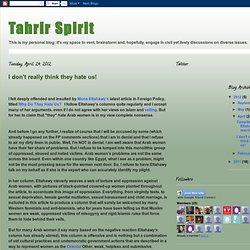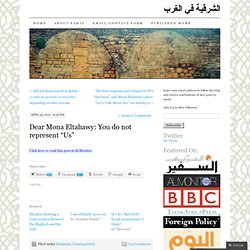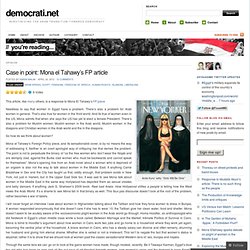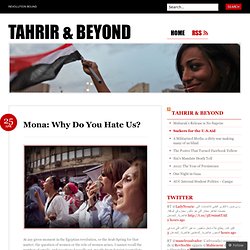

Why Do They Hate Us? - By Mona Eltahawy. In "Distant View of a Minaret," the late and much-neglected Egyptian writer Alifa Rifaat begins her short story with a woman so unmoved by sex with her husband that as he focuses solely on his pleasure, she notices a spider web she must sweep off the ceiling and has time to ruminate on her husband's repeated refusal to prolong intercourse until she too climaxes, "as though purposely to deprive her.

" Just as her husband denies her an orgasm, the call to prayer interrupts his, and the man leaves. After washing up, she loses herself in prayer -- so much more satisfying that she can't wait until the next prayer -- and looks out onto the street from her balcony. She interrupts her reverie to make coffee dutifully for her husband to drink after his nap. Taking it to their bedroom to pour it in front of him as he prefers, she notices he is dead. She instructs their son to go and get a doctor. Yes: They hate us. But let's put aside what the United States does or doesn't do to women. Reuters. Tahrir Spirit: I don't really think they hate us!
I felt deeply offended and insulted by Mona Eltahawy's latest article in Foreign Policy, titled Why Do They Hate Us?

I follow Eltahawy's columns quite regularly and I accept many of her arguments, even if I do not agree with her views on Islam and veiling. But for her to claim that "they" hate Arab women is in my view complete nonsense. And before I go any further, I realize of course that I will be accused by some (which already happened on the FP comments sections) that I am in denial and that I refuse to air my dirty linen in public.
Dear Mona Eltahawy: You do not represent “Us” Thank you for this insight.

However, I didn’t see where using the example of someone who wears the Niqab only at protests fit; I mean that’s like speaking from a blonde’s perspective because I wore a wig on halloween. Also, I think with the photo, it really depends on ones’ perception of the image. For example, you saw the photo as a sexualization of the Niqab where representation was of a seductive woman who accordingly has these intentions in wearing the Niqab, whereas I saw a representation of a girl, who instead of just being able to remain looking the way she was meant to look/ the way she was created, has to cover up in black because society tells her she should. Case in point: Mona el Tahawy’s FP article « democrati.net. Anita Kunz’ witty “Girls Will Be Girls” This article, like many others, is a response to Mona El Tahawy’s FP piece Needless to say that women in Egypt have a problem.

There’s also a problem for Arab women in general. That’s also true for women in the third world. GOOD Mona El Tahawy or native neo-orientalism. It’s probably a particularly sterile waste of time, but here are a few lines on the polemical "Why do they hate us?

" article written for Foreign Policy magazine by Egyptian-born US debater Mona El Tahawy. The cover chosen for that issue of Foreign Policy – a black niqab painted on a woman’s naked body – caused even more furore than the article, a disparity which probably makes to justice to the intellectual substance of El Tahawy’s article. Let me cite the gist of her argument: In a crisp three-and-a-half pages, Rifaat lays out a trifecta of sex, death, and religion, a bulldozer that crushes denial and defensiveness to get at the pulsating heart of misogyny in the Middle East.
GOOD Mona: Why Do You Hate Us? « Tahrir. At any given moment in the Egyptian revolution, or the Arab Spring for that matter, the question of women or the role of women arises.

I cannot recall the number of emails, and questions I usually get, mostly from foreign journalists, about the “role of women in the Egyptian revolution.” My answer is (if i ever answer at all) usually the same and consist of something like “women have been fighting in the forefront of the struggle paving the way to this revolution. They have been beaten, tortured, stripped naked, imprisoned, sacked from their jobs and much more just as much as men if not more including getting their virginity checked.
However, they are not acting as one block of women, but rather as revolutionaries or ordinary people fighting for the revolution’s demands: freedom, dignity, social equality.” It might take some aliens to not understand this, especially as an Egyptian, even for an Egyptian living abroad who visits Egypt a lot for some people. GOOD why they dont hate us. Debating the War on Women - An FP Roundtable. Sondos Asem: Misogyny exists, but blaming it for women's suffering is simplistic Shadi Hamid: Arab women have more agency than you might think Imam Feisal Abdul Rauf: The Prophet Mohammad was a revolutionary feminist Hanin Ghaddar: We need more badass ladies Naheed Mustafa: "Nekkid Burqa Woman" is lazy and insulting Leila Ahmed: Eltahawy misreads Alifa Rifaat Sondos Asem: When I marched to Tahrir Square on Jan. 25, 2011, I was driven by the indignities and suffering endured by all Egyptians, men and women, from decades of corrupt and oppressive rule.

Although I share many of her concerns, I respectfully disagree with Mona Eltahawy's simplistic assertion that the plight of women in the Arab world is the result of being hated by the rest of society -- more specifically, by men, and even more so by newly elected Islamists. Indeed, the status of women is a serious challenge in post-revolutionary Egypt. But how do we move forward? Shadi Hamid: There are no shortcuts. Imam Feisal Abdul Rauf: